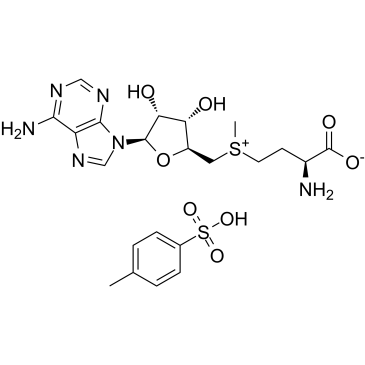S-Adenosyl-L-methionine tosylate (Synonyms: AdoMet, SAM, SAMe) |
| Katalog-Nr.GC61259 |
S-Adenosyl-L-Methionin-Tosylat (S-Adenosyl-Methionin-Tosylat) wird endogen aus Methionin und ATP durch die Wirkung des Enzyms Methionin-Adenosyltransferase produziert und ist ein wichtiger oral aktiver Methylgruppen-Donor.
Products are for research use only. Not for human use. We do not sell to patients.

Cas No.: 52248-03-0
Sample solution is provided at 25 µL, 10mM.
S-Adenosyl-L-methionine tosylate (S-Adenosyl methionine tosylate) is produced endogenously from methionine and ATP by action of the enzyme methionine adenosyltransferase and is an important orally active methyl group donor. S-Adenosyl-L-methionine tosylate is a dietary supplement with potent antidepressant and analgesic effects, and has the potential for liver disease and osteoarthritis research[1][2][3].
S-Adenosyl-L-methionine (Ademetionine) is involved in three main metabolic pathways: 1) methylation, as the principal source of methyl groups in the body; 2) transsulfuration, S-Adenosyl-L-methionine forms S-Adenosylhomocysteine (SAH) and then converted to homocysteine (Hcy) which can be converted to cystathionine then to cysteine and the sulfate (SO4) donated to other metabolic intermediates; and 3) aminopropylation, as S-Adenosyl-L-methionine plays an important role in the synthesis of polyamines which can eventually form and recycle methionine[2].In vitro studies using human articular chondrocytes have shown S-Adenosyl-L-methionine-induced increases in proteoglycan synthesis and proliferation rates in rabbits[2].
Mice lacking methionine adenosyltransferase 1a (Mat1a) have reduced hepatic S-Adenosyl-L-methionine levels and develop oxidative stress, steatohepatitis, and hepatocellular carcinoma (HCC). However, injury and HCC also occur if hepatic S-Adenosyl-L-methionine level is excessive chronically. Thus a normal hepatic S-Adenosyl-L-methionine level is necessary to maintain liver health and prevent injury and HCC[3].
[1]. G M Bressa. et al. S-adenosyl-l-methionine (SAMe) as antidepressant: meta-analysis of clinical studies. Acta Neurol Scand Suppl. 1994;154:7-14. [2]. Wadie I Najm, et al. S-adenosyl methionine (SAMe) versus celecoxib for the treatment of osteoarthritis symptoms: a double-blind cross-over trial. [ISRCTN36233495]. BMC Musculoskelet Disord. 2004 Feb 26;5:6. [3]. Shelly C Lu, et al. S-adenosylmethionine in liver health, injury, and cancer. Physiol Rev. 2012 Oct;92(4):1515-42.
Average Rating: 5 (Based on Reviews and 22 reference(s) in Google Scholar.)
GLPBIO products are for RESEARCH USE ONLY. Please make sure your review or question is research based.
Required fields are marked with *




















